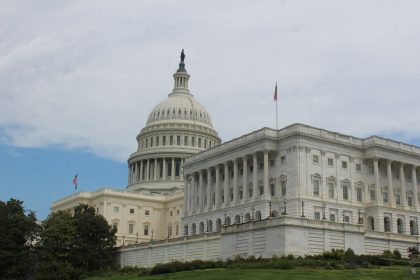Congress Drops Waiver to Allow Free School Meals for All Students

WASHINGTON — President Joe Biden signed the Keep Kids Fed Act into law on June 25 to support school meal programs ahead of the expiration of pandemic-era waivers, but to expedite the bill’s passage before the expiration on June 30, Congress tossed a key provision to provide universal free school meals to all U.S. students.
“The act includes a lot of important and critical provisions. It extends the waivers for the summer and … increases reimbursement for school breakfast and lunch,” said Crystal FitzSimons, who serves as the director of school and out-of-school time programs at the Food and Research Action Center, during a phone call with The Well News.
“The one thing it does not include is the extension of healthy school meals for all for the upcoming school year. We are still calling on Congress to add that into a number of reconciliations which they are talking about doing … we are elevating the need for waivers to be extended for another year,” continued FitzSimons.
Since the start of the COVID-19 pandemic in March 2020, waivers were granted to schools to offer free meals to students without needing to fill out an application for eligibility.
The Keep Kids Fed Act of 2022 ends the waiver to allow for universal free meals and requires schools to return to normal applications and eligibility determinations for students to receive free meals.
“This year has been a struggle for supply chain challenges and increased staffing costs. We need another year to recover but without it schools that have already been really challenged will have to collect these applications and process them, and let families know how to fill out these forms. That’s a lot of administrative costs for school districts,” said FitzSimons.
Although the package will effectively end free school meals for all students, it will still allow students whose family’s income is at or below 130% of the federal poverty line to receive free meals.
“There are significant regional differences in the cost of living that are not addressed in our current system, where there is one income eligibility threshold for families,” said FitzSimons.
According to data from the U.S. Department of Agriculture, schools currently face a 35%-40% increase in food costs due to supply chain and inflation issues, and 92% of school food authorities reported experiencing challenges due to those issues, with nearly three-quarters of the school food authorities experiencing staffing challenges.
The package provides a temporary increase in reimbursement rates and non-cost flexibilities, such as allowing virtual monitoring, for the 2022-23 school year to help return to regular school meal operations.
The federal reimbursement for every school lunch will be increased by 40 cents and every school breakfast by 15 cents, above the annual inflationary adjustment scheduled for July 1.
“Every July 1, the reduced-price reimbursements are adjusted by inflation,” said FitzSimons.
The package has a $3 billion price tag, which is significantly less than the originally proposed $12 billion to fully extend the child nutrition waivers. The price of the package will be fully offset by unused COVID and appropriations funding.
“About three-quarters of school districts reported they had school debt on the books. Schools already struggled with costs, and it will be more of a crisis this year. A lot of school districts are increasing their fees this year because of the increased costs and everything they are facing,” said FitzSimons.
The law will extend USDA’s authority to issue summer nutrition waivers through Sept. 30, 2022, meal pattern waivers through June 30, 2022, and non-cost nationwide waivers through school year 2022–2023.
Meal pattern waivers allow schools to not be penalized if they are not able to meet the required nutrition standards due to supply chain issues.
“The intent is not to undercut nutrition standards, but to respond to the crisis schools have. If they have a truck that arrives and green, leafy veggies aren’t on it, you can substitute a fruit. It’s to allow the USDA to respond to the unique situation that school districts are having. We are all very committed to the nutrition standards,” said FitzSimons.
FitzSimons said that the Healthy, Hunger Free Kids Act of 2010 authorized funding for federal school meal and child nutrition programs and increased access to healthy food for low-income children, but prior to the pandemic the meals were not freely given to all school students in need.
“Before the pandemic hit, kids would show up in the cafeteria and did not have cash in hand or funds in their account, and schools had a policy that they couldn’t charge past a certain meal and those kids had their lunch taken away from them. I would expect some of those stories to pop right back up once schools start charging again,” said FitzSimons.
Movement on the waivers began after Rep. Abigail Spanberger, D-Va., introduced the Keeping School Meals Flexible Act in February. It was followed, in March, by the introduction of the Support Kids Not Red Tape Act in the Senate by Sen. Debbie Stabenow, D-Mich. Both bills sought to extend all the waivers through June 30, 2023.
After negotiations, the Keep Kids Fed Act was introduced in the Senate by Stabenow and Sen. John Boozman, R-Ark., in their capacity as chair and ranking member on the Senate Agriculture Committee, and introduced in the House by Reps. Bobby Scott, D-Va., and Virginia Foxx, R-N.C., in their capacity as the chair and ranking member on the House Committee on Education and Labor.
The Keep Kids Fed Act passed the House on Thursday, June 23; and was sent to the Senate. In order to overcome a last-minute objection from Republican Sen. Rand Paul, R-Ky., and receive unanimous consent before the Senate adjourned, the Senate version returned school meal categories to the pre-pandemic structure.
This was already set to happen if the waivers expired on June 30. It then passed unanimously through the Senate and was sent to the House for final passage. On Friday, June 24, the House passed the bill by voice vote. It was sent to the president and signed into law on Saturday, June 25.
“There were so many benefits to offering students healthy meals throughout the pandemic, and families didn’t have to worry about applications to ensure their kids got a healthy meal at school, and students didn’t feel any stigma or shame for taking a meal. There is widespread recognition of those benefits showing that school meals are the healthiest meals kids are eating,” said FitzSimons.
A 2021 report from Tufts University researchers shows that by 2017-2018, foods consumed at schools improved significantly and provided the best mean diet quality of major U.S. food sources, without population disparities.
“There was some objection to [free school meals] being a part of the bill, and regardless of how it was removed, we are concerned. Families are really struggling and offering free school meals has been a lifeline for many families trying to feed their families,” said Diane Pratt-Heavner, director of media relations at the School Nutrition Association, during a phone call with TWN.
“We need USDA to interpret the law and provide better guidance,” continued Pratt-Heavner.
A spokesperson from the Food and Nutrition Service within the USDA, Alan Shannon, told TWN in an email that as the legislation just passed on Saturday, the team is still working out the details of the next steps.
Although the universal free school meals will end for all students, Pratt-Heavner said there have been four states — California, Maine, Nevada and Vermont — which have passed their own universal meal bills to cover the cost of providing free meals to students.
In Virginia, Eddie Oliver, who serves as the executive director of the Federation of Virginia Food Banks, said during a phone call with TWN that the state has been successful at eliminating the reduced price meal category for students.
He said a few years ago the state included funding in its budget that will pay the difference between what the federal reimbursement is and what is in that reduced price category.
“This change regarding free school meals is coming so late up against the deadline that we need to know how to serve kids … we don’t have a clear plan yet,” said Oliver.
“I believe free school meals is something that should be done at the federal level. It’s in the best interest of kids across the country and that’s what we are trying to push for,” continued Oliver.
Alexa can be reached at [email protected]
This article has been corrected to reflect the fact the final package was not a compromise between the Spanberger bill and the Stabenow bill. The final package, the Keep Kids Fed Act, was the result of negotiations between Senate and House Democrats and Republicans. The original article was correct in stating that the Keeping School Meals Flexible Act was introduced by Rep. Abigail Spanberger, D-Va., in February, and that, like the Support Kids Not Red Tape Act in the Senate, Spanberger’s bill sought to extend all the waivers through June 30, 2023. After negotiations, the Keep Kids Fed Act was introduced in the Senate by Sens. Debbie Stabenow, D-Mich., and John Boozman, R-Ark., in their capacity as Chair and Ranking Member on the Senate Agriculture Committee, and introduced in the House by Reps. Bobby Scott, D-Va., and Virginia Foxx, R-N.C., in their capacity as the Chair and Ranking Member on the House Committee on Education and Labor.

























